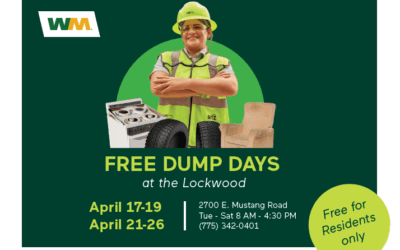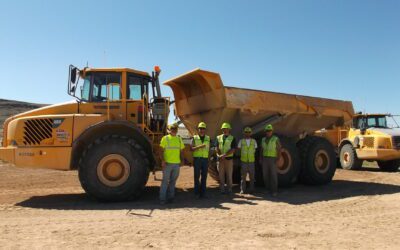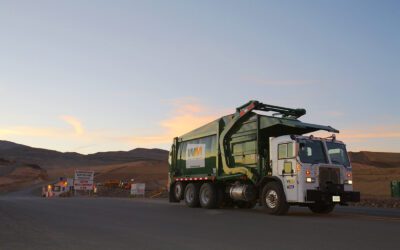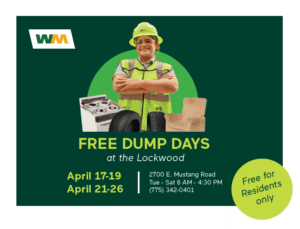Free Dump Days at Lockwood Regional Landfill to encourage responsible disposal and reduce dumping...
Lockwood Landfill
A fully permitted Class I Municipal Solid Waste landfill focused on minimizing its environmental impact, whether converting landfill gas to energy, implementing sustainable practices to have a positive effect on the community, or providing NWHC-certified habitat for wild mustangs, raptors, and other indigenous wildlife.
Address
2700 East Mustang Road
Sparks, NV 89434
Public Rate Sheet (PDF)
Hours
Monday – Friday: 8:00 a.m. – 4:30 p.m.
Saturday: 8:00 a.m. – 12:30 p.m. and 1:00pm – 4:30 p.m.
Sunday – Closed
The facility is closed to the public the following holidays:
- News Year’s Day
- Martin Luther King Jr.
- Memorial Day
- Fourth of July
- Labor Day
- Nevada Day
- Thanksgiving
- Christmas
Map
Accepted Materials
Lockwood Landfill is a fully permitted Class I Municipal Solid Waste landfill permitted to accept non-hazardous, municipal solid waste.
Accepted:
Appliances with Freon
Appliances with freon are appliances that use refrigerants containing chlorofluorocarbons (CFCs) or hydrochlorofluorocarbons (HCFCs).
Examples of appliances that may contain freon include:
- window and whole house air conditioners
- refrigerators
- freezers
- electronically chilled water coolers
- dehumidifiers
- some types of heat pumps
Appliances without Freon
Appliances without freon are appliances that do not contain refrigerants. Examples of such appliances include:
- washing machine
- clothes dryer
- hot water heater
- conventional oven
- microwave oven
- stove
- trash compactor
- residential furnace
When disposing of appliances without freon, it is still important to follow proper procedures to ensure that they are recycled or disposed of in an environmentally responsible manner.
Note that electronic devices such as televisions, computers, telephones, stereo equipment, calculators, etc. are not considered appliances and are instead classified as electronic waste.
Facilities That Accept This MaterialAppliances without FreonAsbestos - Friable
Friable asbestos refers to a type of asbestos that can be easily crumbled or pulverized into a powder with minimal pressure or handling. Asbestos is a naturally occurring mineral that was widely used in building materials and insulation products due to its heat-resistant properties.
Facilities That Accept This MaterialAsbestos - FriableAsbestos - Non-Friable
Non-friable asbestos, also known as bonded asbestos, is a type of asbestos that is mixed with another material such as cement or vinyl, making it less likely to release asbestos fibers into the air.
Non-friable asbestos is commonly found in building materials such as:
- floor tiles
- roofing shingles
- insulation
- Ash
Concrete - Clean
Clean concrete refers to concrete that is free of any contaminants or foreign materials. To be considered clean, concrete should not contain any materials that could compromise its durability or decompose over time, such as soil, debris, organic matter, or chemicals.
Clean concrete can be recycled and reused in various applications, such as road base, landscaping, or as an aggregate in new concrete. Recycling clean concrete is an environmentally sustainable practice that can reduce the amount of waste that ends up in landfills and can save natural resources.
However, it is important to note that not all concrete can be considered clean. Concrete that has been contaminated with hazardous materials, such as oil, chemicals, or heavy metals, may need to be disposed of as hazardous waste and require special handling and disposal procedures.
Facilities That Accept This MaterialConcrete - CleanConcrete - Mixed
Mixed concrete refers to concrete that has been contaminated with other materials, such as wood, metal, plastics, or other types of waste. This can happen when concrete is demolished or removed from a construction site and mixed with other waste materials.
Mixed concrete can be considered a type of construction and demolition (C&D) waste. Proper disposal of mixed concrete is important to reduce the amount of waste that ends up in landfills and to prevent environmental contamination.
However, it is important to note that concrete that has been contaminated with hazardous materials, such as oil, chemicals, or heavy metals, may need to be disposed of as hazardous waste and require special handling and disposal procedures.
Facilities That Accept This MaterialConcrete - MixedConstruction and Demolition Debris
Construction and demolition (C&D) waste refers to the waste generated from construction, renovation, and demolition activities. This type of waste can include a wide range of materials, such as concrete, bricks, lumber, roofing materials, insulation, plastics, metals, and more.
C&D waste can be managed and disposed of in a variety of ways, depending on the type and quantity of waste, as well as local regulations. Common methods of managing C&D waste include:
- Recycling: Many C&D materials can be recycled and reused in new construction or other applications, such as road base, soil amendment, or landscaping. Recycling C&D waste can help to conserve natural resources and reduce the need for virgin materials.
- Landfilling: Some C&D waste may need to be disposed of in landfills. Landfills that accept C&D waste must meet certain standards to prevent environmental contamination and protect human health.
Dirt/Soil - Clean
To be considered clean, soil must meet certain criteria, such as not containing any hazardous materials, pesticides, or other harmful substances. Soil can become contaminated from a variety of sources, such as industrial activities, landfills, or accidental spills.
Clean soil can be recycled and reused in various applications, such as filling excavations or restoring disturbed land. Recycling clean soil is an environmentally sustainable practice that can reduce the need for virgin soil and conserve natural resources.
However, it is important to note that not all soil can be considered clean. Soil that has been contaminated with hazardous materials, such as lead, asbestos, or heavy metals, may need to be disposed of as hazardous waste and require special handling and disposal procedures.
Facilities That Accept This MaterialDirt/Soil - CleanDirt/Soil - Contaminated
Contaminated soil is soil that has been impacted by the presence of hazardous substances, such as heavy metals, petroleum products, pesticides, or other chemicals. The contamination can occur as a result of industrial activities, spills, leaks, or improper disposal of hazardous waste.
The management and disposal of contaminated soil require specialized handling and treatment to ensure that the hazardous substances are removed or contained properly. The appropriate management and disposal of contaminated soil depend on the type and extent of contamination, as well as local and state regulations.
Facilities That Accept This MaterialDirt/Soil - ContaminatedFurniture - Stuffed
Stuffed furniture is any furniture that contains stuffing, padding, or other materials that can make it difficult to dispose of or recycle. This can include items such as couches, chairs and other upholstered furniture.
In many areas, stuffed furniture can be disposed of in landfills. However, this is not the most environmentally friendly option, as the materials in the furniture can take a long time to decompose and can release harmful chemicals into the environment.
Before dumping stuffed furniture, consider:
- Donation: If the furniture is in good condition, it can be donated to charities or other organizations that can use it. Many donation centers will accept stuffed furniture, but may have specific guidelines or requirements for what they can accept.
- Disassembly: In some cases, the materials in the furniture can be disassembled and recycled or disposed of separately. For example, the wood frame of a couch can be recycled separately from the foam padding.
Mattresses and Box Springs
Mattresses and box springs are common household items that can be challenging to dispose of because they are bulky and not easily recyclable. However, there are several ways to dispose of them in an environmentally friendly manner:
- Donation: If your mattress and box spring are in good condition, you may be able to donate them to a charity or non-profit organization that accepts used bedding. Some organizations, such as homeless shelters, halfway houses, and veterans’ organizations, may accept donations of gently used mattresses and box springs.
- Bulk waste pickup: Some municipalities offer bulk waste pickup services, where you can schedule a pickup of large items, such as mattresses and box springs, for a fee. Check with your local waste management provider or municipality to see if this service is available in your area.
- Landfill: If bulk waste pickup is not available, you can dispose of your mattress and box spring at a landfill that accepts bulky waste.
Regardless of the disposal method you choose, it is important to check with your local waste management facility or municipality for any specific guidelines or restrictions on the disposal of mattresses and box springs in your area.
Facilities That Accept This MaterialMattresses and Box SpringsSludge
Sludge is a semi-solid or solid residue that is generated from wastewater treatment processes. Sludge is typically composed of organic and inorganic materials such as human and animal waste, food scraps, and other debris that is removed from wastewater during treatment.
Sludge can be generated from various sources such as domestic and industrial wastewater treatment plants, water treatment plants, and other sources that produce wastewater. It can contain a range of pollutants including pathogens, heavy metals, organic compounds, and other contaminants that can be harmful to the environment and public health if not disposed of properly.
The proper disposal of sludge is important to prevent contamination of soil and water resources.
Facilities That Accept This MaterialSludgeTires - Car
Disposing of tires properly is important to prevent them from becoming environmental hazards. Car, truck, and tractor tires are all made of similar materials and can be disposed of in similar ways.
Tires can be disposed of in landfills, but many landfills have restrictions on the number of tires that can be disposed of at one time or offer different pricing depending on the size of the tires. Additionally, tires take up a lot of space in landfills and can pose environmental risks if not managed properly.
Before dumping tires, you should consider:
- Recycling: Tires can be recycled into a variety of products, such as rubberized asphalt for road surfaces or playground mulch. Check with local recycling facilities or tire manufacturers to see if they offer tire recycling programs.
- Tire retailers: Many tire retailers will accept used tires for disposal or recycling. Check with local tire retailers to see if they offer this service.
- Collection events: Some communities hold tire collection events where residents can dispose of their tires for free or for a small fee.
When disposing of tires, it is important to avoid illegal dumping or burning, as these can cause environmental and health hazards.
Facilities That Accept This MaterialTires - CarTires - Tractor
Disposing of tires properly is important to prevent them from becoming environmental hazards. Car, truck, and tractor tires are all made of similar materials and can be disposed of in similar ways.
Tires can be disposed of in landfills, but many landfills have restrictions on the number of tires that can be disposed of at one time or offer different pricing depending on the size of the tires. Additionally, tires take up a lot of space in landfills and can pose environmental risks if not managed properly.
Before dumping tires, you should consider:
- Recycling: Tires can be recycled into a variety of products, such as rubberized asphalt for road surfaces or playground mulch. Check with local recycling facilities or tire manufacturers to see if they offer tire recycling programs.
- Tire retailers: Many tire retailers will accept used tires for disposal or recycling. Check with local tire retailers to see if they offer this service.
- Collection events: Some communities hold tire collection events where residents can dispose of their tires for free or for a small fee.
When disposing of tires, it is important to avoid illegal dumping or burning, as these can cause environmental and health hazards.
Facilities That Accept This MaterialTires - TractorTires - Truck
Disposing of tires properly is important to prevent them from becoming environmental hazards. Car, truck, and tractor tires are all made of similar materials and can be disposed of in similar ways.
Tires can be disposed of in landfills, but many landfills have restrictions on the number of tires that can be disposed of at one time or offer different pricing depending on the size of the tires. Additionally, tires take up a lot of space in landfills and can pose environmental risks if not managed properly.
Before dumping tires, you should consider:
- Recycling: Tires can be recycled into a variety of products, such as rubberized asphalt for road surfaces or playground mulch. Check with local recycling facilities or tire manufacturers to see if they offer tire recycling programs.
- Tire retailers: Many tire retailers will accept used tires for disposal or recycling. Check with local tire retailers to see if they offer this service.
- Collection events: Some communities hold tire collection events where residents can dispose of their tires for free or for a small fee.
When disposing of tires, it is important to avoid illegal dumping or burning, as these can cause environmental and health hazards.
Facilities That Accept This MaterialTires - TruckVehicles - Trailers
The disposal of a trailer can depend on a few factors, such as its size, condition, and materials. Some landfills may accept trailers for disposal, but it is important to check with your local landfill first to see if they have specific requirements or restrictions for trailer disposal.
Here are some other environmentally friendly disposal options for trailers:
- Sell or donate: If the trailer is still in good condition, you may be able to sell it or donate it to a charitable organization.
- Recycling: Some facilities specialize in trailer recycling, and they can break down the trailer into individual parts for recycling. These facilities can be found in many areas, and they can be a good option if the trailer is no longer roadworthy.
- Scrapyard: Some scrapyards may accept trailers for scrap metal. They will typically remove any hazardous materials and dispose of them properly before crushing the trailer and recycling the metal.
Waste - Electronic
E-waste is the informal name for electronic products nearing the end of their “useful life” (sometimes referred to as Universal Waste). Many of these products can be reused, refurbished, or recycled.
Common electronic waste products are:
- computers
- televisions
- VCRs
- stereos
- copiers
- fax machines
- cell phones
Waste - Green/Organic
Green or organic waste is a type of waste material that is derived from plant or animal sources (with the exception of animal waste) and can be decomposed through natural processes. This type of waste includes items such as:
- grass clippings
- leaves
- tree trimmings
- branches
- food waste
Green waste can be a valuable resource when properly managed and disposed of. Composting is a common method of managing green waste, where it is placed in a controlled environment and allowed to decompose into a nutrient-rich soil amendment.
Many WM facilities are equipped to do large-scale composting that helps prevent it from ending up in landfills, where it can release methane gas and other harmful pollutants into the environment. Instead, green waste can be diverted from landfills and used in more sustainable ways to benefit the environment and the community.
Facilities That Accept This MaterialWaste - Green/OrganicWaste - Household Hazardous
Household hazardous waste (HHW) refers to any hazardous waste generated from household materials or products. This type of waste includes items such as:
- cleaning agents
- automotive chemicals
- paints and solvents
- rubber cement
- batteries
- fluorescent bulbs
HHW is often found in households and small businesses and can pose a significant risk to human health and the environment if not handled and disposed of properly. Many HHW items contain chemicals that can be toxic, flammable, or corrosive, and can cause injury or illness if not managed correctly.
It is important to properly dispose of HHW to ensure that these materials are not released into the environment or landfills, where they can pose a risk to human health and the ecosystem.
Additional HHW items: all-purpose cleaners, anti-freeze, brake fluid, disinfectants, drain opener, furniture polish, household cleaners, motor oil, oven cleaner, rug cleaner, silver polish, solvents, toilet bowl cleaner, tub/tile cleaner.
Facilities That Accept This MaterialWaste - Household HazardousWaste - Industrial and Special
Industrial/special waste is a type of waste generated by businesses and industries that may require special handling and disposal methods due to its potential to harm human health or the environment. This type of waste includes materials such as:
- chemicals
- heavy metals
- hazardous construction and demolition debris
Proper management and disposal of industrial/special waste is essential to protect human health and the environment. Governments regulate the handling and disposal of these materials to ensure that they are stored, transported, treated, and disposed of safely and responsibly. Companies that generate industrial/special waste are required to comply with specific regulations and guidelines to ensure that these materials are managed appropriately.
Facilities That Accept This MaterialWaste - Industrial and SpecialWaste - Municipal Solid
Municipal solid waste (MSW) refers to the waste (trash, garbage, rubbish) generated by households, commercial establishments, and institutions, such as schools and hospitals. It includes a variety of materials, such as food waste, paper, plastics, glass, metals, and other materials.
MSW is typically collected by municipal governments and transported to a landfill or waste-to-energy facility for disposal. In some areas, MSW is also sorted and processed to recover recyclable materials, such as paper, plastics, and metals, which are then sold to manufacturers to make new products and reduce the environmental impact of its disposal.
Facilities That Accept This MaterialWaste - Municipal SolidWood - Clean
Clean wood refers to untreated and unpainted wood that is free from any contaminants such as nails, screws, or staples. Clean wood can include items such as pallets, lumber, and tree branches. Clean wood waste can often be recycled into mulch, animal bedding, or fuel.
It is important to properly dispose of clean wood waste to avoid contamination of other waste streams and to reduce the amount of waste sent to landfills.
Facilities That Accept This MaterialWood - CleanWood - Treated
Treated can contain hazardous chemicals that can pose a risk to human health and the environment. Treated wood is typically wood that has been treated with preservatives to protect it from decay and insects.
The preservatives used in treated wood can include chemicals such as chromated copper arsenate (CCA), which contains arsenic, copper, and chromium, as well as other chemicals like creosote and pentachlorophenol. These chemicals can leach out of the wood over time and contaminate soil and water if not properly handled and disposed of.
The proper handling and disposal of treated wood will depend on the level of contamination and the specific type of treatment. In general, treated wood waste should not be burned or incinerated, as this can release harmful chemicals into the air. Instead, it should be disposed of at a facility that is licensed to handle hazardous waste.
Facilities That Accept This MaterialWood - Treated
Not Accepted:
-
Biosolids
Biosolids are nutrient-rich organic materials that are derived from the treatment of municipal wastewater (sewage). They are produced through a process known as sewage sludge treatment, which involves removing and treating the solids that remain after the initial wastewater treatment process.
Biosolids are typically rich in nitrogen, phosphorus, and other essential nutrients, making them a valuable resource for agricultural and horticultural applications.
However, the use of biosolids is regulated to ensure that they meet strict quality and safety standards. Before they can be used, biosolids must undergo a rigorous treatment process to remove pathogens, heavy metals, and other contaminants. In addition, their application is closely monitored to prevent contamination of waterways and other environmental risks.
Facilities That Accept This MaterialBiosolids -
Bulk Roofing Material - Composition
Proper disposal of composition bulk roofing materials is important to prevent environmental contamination and ensure compliance with local and state regulations. Many composition bulk roofing materials can be disposed of in a landfill. However, some local regulations may require that the materials be separated from other waste materials and transported to a designated landfill facility.
Some composition bulk roofing materials, such as asphalt shingles, can be recycled. Recycling facilities may accept the materials and process them into new products such as road paving materials.
Facilities That Accept This MaterialBulk Roofing Material - Composition - Cardboard
-
Carpet and Carpet Padding
Carpet and carpet padding can often be recycled, depending on the materials and condition of the items. Many recycling facilities accept carpet and padding and process them into new products, such as carpet tiles or insulation materials. If recycling is not an option, carpet and carpet padding can be disposed of in a landfill.
Check with your local landfill or recycling facility to see if they accept these materials and what requirements they may have for preparing the materials for disposal.
Facilities That Accept This MaterialCarpet and Carpet Padding -
Dirt/Soil - Mixed
Mixed soil refers to soil that contains a mixture of different types of soil, such as topsoil, subsoil, and clay. Mixed soil may also contain other materials, such as rocks, gravel, or construction debris.
Mixed soil is often generated from excavation activities, such as digging foundations, grading land, or installing utilities. The composition of mixed soil can vary depending on the location and the type of excavation activities that took place.
From a waste disposal standpoint, mixed soil is typically classified as non-hazardous waste and can be disposed of in a landfill that accepts construction and demolition waste. However, some jurisdictions may require that mixed soil be tested for contamination before disposal to ensure that it does not pose a risk to human health or the environment.
Facilities That Accept This MaterialDirt/Soil - Mixed -
Metal
Metal and mixed metal are two different types of waste that require different handling and disposal methods.
Metal waste refers to items made entirely of metal, such as aluminum cans, steel pipes, and copper wire. Metal waste can often be recycled by melting it down and using it to create new products. Recycling metal waste is an environmentally friendly option that helps conserve natural resources and reduce greenhouse gas emissions.
Mixed metal waste, on the other hand, refers to a mixture of different metals, such as aluminum, steel, and copper, as well as other materials such as plastic, rubber, and wood.
Facilities That Accept This MaterialMetal -
Metals - Mixed
Metal and mixed metal are two different types of waste that require different handling and disposal methods.
Mixed metal waste can be generated from various sources, such as manufacturing, construction, and demolition activities. Because mixed metal waste contains a variety of materials, it is more challenging to recycle than pure metal waste.
Mixed metal waste must be sorted and separated into its individual components before it can be recycled. This can be a complex and costly process that requires specialized equipment and expertise. In some cases, mixed metal waste may not be able to be recycled at all and must be disposed of in a landfill that accepts mixed waste.
Facilities That Accept This MaterialMetals - Mixed -
Mixed Debris
Mixed debris refers to a combination of different types of waste materials, such as wood, concrete, brick, drywall, and metals, that are mixed together and require disposal. Mixed debris can be generated from various sources, such as construction and demolition activities, renovations, and household cleanouts.
From a waste disposal standpoint, mixed debris is typically classified as non-hazardous waste and can be disposed of in a landfill that accepts construction and demolition waste. However, some jurisdictions may have restrictions on what types of materials can be disposed of in landfills and may require that mixed debris be sorted and separated before disposal to ensure that any hazardous materials are handled appropriately.
Facilities That Accept This MaterialMixed Debris -
Oil Filters
Oil filters should be disposed of properly to prevent environmental contamination. Used oil filters contain residual oil and can be considered hazardous waste if not handled and disposed of appropriately. Here are some options for proper disposal of oil filters:
- Recycling: Many parts stores, service stations, and waste management facilities accept used oil filters for recycling. Recycling facilities can crush and melt down the metal filter casing and reuse the metal to make new products.
- Curbside pickup: In some areas, local waste management services offer curbside pickup of used oil filters along with other hazardous waste items. Check with your local waste management facility or municipality to see if this service is available in your area.
- Drop-off sites: Some communities have designated drop-off sites for used oil filters and other hazardous waste items. These sites are typically located at municipal waste facilities or recycling centers.
- Landfills: If none of the above options are available in your area, you can dispose of used oil filters in a landfill that accepts hazardous waste. However, it is important to check with your local waste management facility or municipality for any specific guidelines or restrictions on the disposal of used oil filters in your area.
Regardless of the disposal method you choose, it is important to properly drain the oil from the filter and place it in a sealed container before disposal. Used oil should also be disposed of properly, as it can also be considered hazardous waste.
Facilities That Accept This MaterialOil Filters -
Propane Tanks and Cylinders
Propane tanks and cylinders are considered hazardous waste and should not be disposed of in your regular trash. Before disposing of propane tanks or cylinders, first consider exchanging them instead. Many propane suppliers and retailers offer exchange programs where you can trade in your empty tank for a full one. This is a convenient option if you use propane regularly and have a spare tank on hand.
If none of the above options are available, some WM landfills, transfer stations and recycling centers are equipped to properly dispose of propane tanks.
Facilities That Accept This MaterialPropane Tanks and Cylinders -
Recyclables
Recyclables are materials that can be processed and reused to make new products. They include a wide range of materials such as paper, cardboard, glass, aluminum cans, steel cans, plastic bottles and containers, and certain types of electronics.
Here are some examples of commonly recycled materials:
- Paper: This includes newspapers, magazines, office paper, and cardboard.
- Glass: This includes clear, green, and brown glass bottles and jars.
- Aluminum cans: This includes soda cans, beer cans, and food cans.
- Steel cans: This includes food cans and aerosol cans.
- Plastic bottles and containers: This includes water bottles, soda bottles, milk jugs, and laundry detergent containers.
Recycling helps to conserve natural resources, reduce waste, and reduce the amount of materials that end up in landfills or incinerators. It also helps to reduce pollution and conserve energy by reducing the need to extract and process raw materials.
Facilities That Accept This MaterialRecyclables -
Solar Panels
Solar panels should not be disposed of in regular trash or recycling bins, as they may contain hazardous materials that can harm the environment. Solar panels are made of various materials such as glass, silicon, and metals and are designed to last for many years. At the end of their life cycle, solar panels should be disposed of properly to avoid environmental damage and to recover valuable materials.
Some landfills may accept solar panels for disposal, but before dumping your solar panels, consider:
- Recycling: Many solar panel manufacturers and recycling facilities offer recycling programs for end-of-life solar panels. Through these programs, the panels are disassembled and the materials are recovered for reuse. Check with the manufacturer or local recycling facilities to see if they offer this service.
- Take-back programs: Some solar panel manufacturers offer take-back programs where they will accept end-of-life panels for disposal. Check with the manufacturer to see if they offer this service.
- Donations: If the solar panels are still functioning, they can be donated to organizations or communities that could use them for their energy needs.
-
Vehicles - Auto Shredder Residue
Auto shredder residue (ASR) is the material that remains after a vehicle is shredded for metal recycling. When a vehicle is shredded, it goes through a process of being crushed and torn apart, with the metal components being separated from non-metal materials such as plastics, rubber, foam, glass, and other materials.
ASR is a complex mixture of materials that can be difficult to dispose of and can contain hazardous substances such as heavy metals, organic chemicals, and asbestos. The exact composition of ASR can vary depending on the type of vehicle being shredded and the shredding process used.
Disposing of ASR can be a challenge due to its composition and potential environmental impact.
Facilities That Accept This MaterialVehicles - Auto Shredder Residue -
Vehicles - Boats
Disposing of a boat can be a challenging task, as boats are typically large, heavy, and made of a variety of materials that require specialized disposal. Some landfills may accept boats for disposal, but it is important to check with your local landfill first to see if they have specific requirements or restrictions for boat disposal.
Here are some additional disposal options for boats:
- Donate or sell: If your boat is still in good condition, you may be able to donate it to a charity or sell it to someone who can use it. There are many organizations that accept boat donations, such as nonprofit organizations or boat schools.
- Dismantle and recycle: Boats can be dismantled and the materials can be recycled. Boats are made of various materials such as fiberglass, metal, and wood, which can be salvaged for reuse or recycling. Some facilities specialize in boat recycling and can properly dispose of the various materials.
- Surrendered Vessel Program: Some coastal states and municipalities have implemented Surrendered Vessel Program (SAVE), which offer free or low-cost disposal options for boats that have been abandoned or become derelict.
-
Vehicles - Engines
Disposing of a vehicle engine can be a challenge because engines contain hazardous materials, such as lead, cadmium, and chromium, which can be harmful to human health and the environment. Some landfills may accept engines for disposal, but it is important to check with your local landfill first to see if they have specific requirements or restrictions for engine disposal.
Here are some other disposal options for vehicle engines:
- Sell or donate: If the engine is still in good working condition, you may be able to sell or donate it to someone who can use it. There are many automotive shops or engine rebuilders who may be interested in purchasing used engines.
- Recycle: Engines can be recycled for their metal content. Many scrapyards and recycling facilities will accept used engines for recycling, and some may even pay you for the scrap metal.
-
Vehicles - RVs
Disposing of an RV can be a complex process as it contains many materials that may be hazardous to the environment. Some landfills may accept RVs for disposal, but it is important to check with your local landfill first to see if they have specific requirements or restrictions for RV disposal.
Here are some other environmentally friendly disposal options for an RV:
- Sell or donate: If the RV is still in good condition, you may be able to sell it or donate it to a charitable organization.
- Recycling: Some facilities specialize in RV recycling, and they can break down the vehicle into individual parts for recycling. These facilities can be found in many areas, and they can be a good option if the RV is no longer roadworthy.
- Scrapyard: Some scrapyards may accept RVs for scrap metal. They will typically remove any hazardous materials and dispose of them properly before crushing the RV and recycling the metal.
-
Waste - Infectious or Biohazard
Infectious/biohazard waste refers to waste that is contaminated with or could potentially be contaminated with infectious agents, such as bacteria, viruses, or other microorganisms that pose a risk to human health. This type of waste includes materials such as:
- used needles and syringes
- laboratory specimens
- animal carcasses or tissues
Infectious/biohazard waste can be generated by a variety of sources, including healthcare facilities, research laboratories, veterinary clinics, and households with individuals who require home health care.
Due to the potentially harmful nature of infectious/biohazard waste, it is important to handle and dispose of these materials in a safe and responsible manner to protect public health and the environment.
Facilities That Accept This MaterialWaste - Infectious or Biohazard -
Waste - Liquid
Liquid waste refers to any waste material that is in liquid form and is typically produced from industrial, commercial, or household activities. Examples of liquid waste include:
- wastewater from domestic or industrial sources
- oil
- chemicals
- medical waste liquids
- other hazardous liquids.
Liquid waste can be generated from a variety of sources, including manufacturing processes, agricultural activities, and households. The waste may contain a variety of contaminants, including heavy metals, chemicals, and other hazardous substances, and must be treated and disposed of in a safe and environmentally sound manner to avoid contaminating soil, water, or air.
Facilities That Accept This MaterialWaste - Liquid -
Wood - Painted
Painted wood can contain hazardous materials such as lead, arsenic, and other chemicals that can be harmful to human health and the environment.
Depending on the level of contamination, painted wood may need to be disposed of as hazardous waste, which typically requires specialized handling and disposal methods. In some cases, painted wood may be treated to remove the hazardous materials or separated into different waste streams for proper disposal.
Facilities That Accept This MaterialWood - Painted -
Wood - Stained
Wood stains can contain chemicals that can be harmful to human health and the environment, so it is important to properly dispose of stained wood.
The disposal of stained wood will depend on the level of contamination and the specific type of stain. Some stains may be water-based and considered non-hazardous, while others may contain chemicals that are hazardous and require specialized handling and disposal methods.
Facilities That Accept This MaterialWood - Stained
*Waste - Industrial and Special - customers must discuss the type of waste with the district manager prior to disposal.
Recycling
We are continually exploring ways to reduce waste into the landfill to help conserve natural resources and landfill space by recycling. Among the many materials it diverts from the landfill for new uses are:- Asphalt
- Construction and demolition (cement, brick, wood, etc)
- Corrugated Cardboard
- Used Oil
- Used Antifreeze
Services

Bulky Item Drop Off
Need to dispose of large, bulky waste like household appliances, furniture, mattresses and box springs? This facility is designated to accept these items.
Check our rate sheet for pricing, requirements and limitations.

Construction Debris Drop Off
This facility is designated to accept C&D debris for drop off. Common C&D materials include lumber, drywall, metals, brick, concrete, carpet, plastic, pipe, rocks, dirt, etc.
Please check our rate sheet for costs, requirements and limitations.
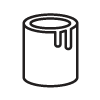
Household Hazardous Waste Drop Off
This facility is designated to accept Household Hazardous Waste. Common HHW items include paints, solvents, cleaning products, batteries, and motor oil.
Please check our rate sheet for costs, requirements, and limitations.

Organics/Green Waste Drop Off
This facility accepts organic materials such as yard clippings, tree trimmings, and food scraps for composting, repurposing, or recycling.
Please check our rate sheets for costs, requirements, and limitations.

Trash Drop Off
Customers can drop off municipal solid waste (MSW), commonly known as trash or garbage, at this facility. Before dumping items as MSW, consider if they may be recyclable materials, organics, bulky trash or other items that may fall into a designated disposal category.
Check our rate sheet for pricing, exclusions and limitations.
Facility Highlights
Certified Wildlife Habitat for Wild Mustangs
In 2010, the National Wildlife Habitat Council certified the Lockwood Landfill a Wildlife Habitat...
Free Dump Days & Annual BBQ at Lockwood
In an effort to assist residents with household clean ups and to curb illegal dumping, the...
Landfill Gas to Energy at Lockwood
The Lockwood Landfill is engineered to protect the air, surface and groundwater and provide a...


